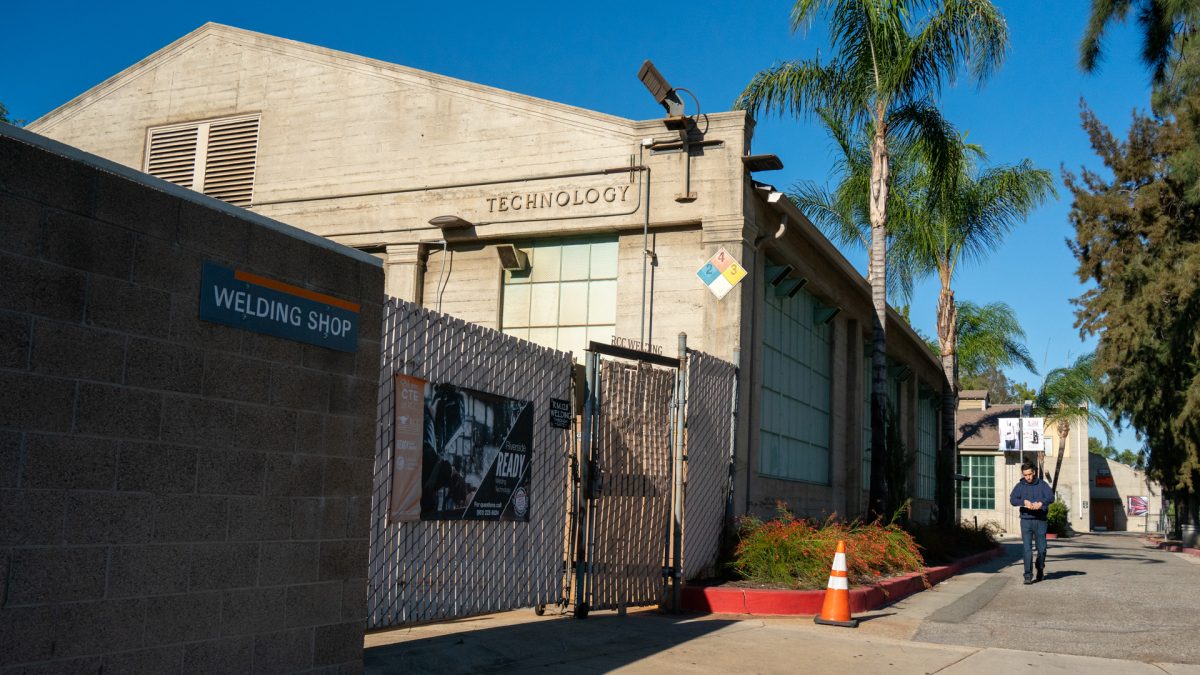Updated: Dec. 3, 2015 | Written by Viewpoints Staff
Updates:
Dec. 4 David Bowdich, assistant director of the FBI’s Los Angeles office, said in a news press conference that the investigation is being handled by the FBI as a “terrorist attack.”
Dec. 3 Police narrowed it down to two suspects, a third suspect was let go for no involvement and the number of injured has risen from 17 to 21. Also, police found 12 pipe bombs in the Redlands townhouse raid.
Dec. 2 In a press conference held by a regional mosque leader after the shooting, the brother-in-law of Farook, gave his thoughts on his relatives involvement in the event.
“I have no idea why he would do that, why he would do something like this. I’m in shock,” said Farhan Khan, a relative of Farook, at press conference.
Dec. 3 Eight names have been released of the victims who were injured and died in the events which took place Dec. 2.
Fatalities
Daniel Kaufman, 42 – Worked at a coffee shop in the Inland Regional Center.
Damian Meins, 58 – spent 28 years working for Riverside County and had recently returned to a position with the Environmental Health Dept. after retiring in 2010.
Nicholas Thalasinos, 52 – Worked as an environmental health specialist for the department of public health, the same agency that employed shooter Syed Farook.
Mike Raymond Wetzel, 37 – A father of six, worked as a Supervising environmental health specialist with San Bernardino County.
Beneta Betnadal, 46 – Mother of three kids and wife of Riverside Community College District police and safety officer Arlen Verdehyou.
In an official statement the Chancellor of RCCD had this to say about what has transpired to officer Verdehyou’s wife.
“Dear Colleagues, It is with profound sadness that I share with you that Beneta Betnadal, beloved wife of Arlen Verdehyou, RCCD police and safety officer was one of the victims in the shooting at the Inland Regional Center in San Bernardino yesterday. Arlen is with his family, his wife’s family and RCCD police personnel. His wife is survived by Arlen, their three children, and her family. Please keep the Verdehyou and Betnadal families in your thoughts.”
Michael Burke
Michael L. Burke, Ph.D.
Chancellor
According to the San Bernardino Coroners office, all of the names of those who were killed in yesterdays events were released.

Injured
Patrick Baccari, 55 – Baccari was about to dry his hands in the bathroom when bullets ripped into the towel dispenser, sending shrapnel into his face, according to the LA Times.
Kevin Ortiz, 24 – Ortiz worked as a county environmental inspector and was shot twice in the leg and once in the shoulder. Amid the chaos, Ortiz managed to call his wife of two weeks and father to tell them he was alive, according to the LA Times
Julie Paez, (age to be announced) – Paez had texted her family in a group chat “Love you guys,” shortly after messaging them”Was shot,”according to the LA Times.
Denise Peraza, 27 – Peraza hid under a desk when she was shot in the lower back. She recanted that the shooters were gone shortly after opening fire and everything was silent for about five minutes. Then the doors were thrown open again by law enforcement officers. Lots of them, and they yelled out: “Anyone who can move, leave immediately and find cover behind vehicles,” according to the La Times.
——————-
Authorities have confirmed that 14 people were killed and 21 were injured during a shootout located in the Inland Regional Center on Dec. 2 in San Bernardino.
Two suspects, a male suspect identified as Syed Farook and an unidentified woman, were killed after the incident by police, according to the Los Angeles Times.
A third suspect was seen fleeing the scene and was later taken into custody, although it is unclear whether he was involved with the other two suspects, according to Jarrod Burguan, San Bernardino police chief.
According to public records, Farook worked as an environmental health specialist for San Bernardino County. The other male suspect is believed to be Farook’s brother, according to NBC.
“I spoke to him a week ago … I have no idea why he would do something like this. I have absolutely no idea. I am in shock myself,” Farhan Khan, brother-in-law of the suspect Syed Farook said in a press conference held by the Council on American-Islamic Relations.
It has also been confirmed that there were two rifles and two handguns recovered in the San Bernardino investigation by the Bureau of Alcohol, Tobacco, Firearms and Explosives after the first events. Police were also able to gain access into the regional center and escort people inside of the building outside.
[youtube https://www.youtube.com/watch?v=xXVDqmCEdX0]
A bomb threat was phoned in to Loma Linda University Medical Center as stated by the Press-Enterprise in a tweet.
Soon after police were seen guarding Arrowhead Regional Medical Center (other location victims were taken too) after hearing about bomb threat phoned in to Loma Linda University Medical Center as stated by Daily Bulletin in a tweet.
Business and organizations in the surrounding area such as the Humane Society, Big Lots, and Target were on lockdown at the Humane Society of San Bernardino according to Jeanette Pardo a volunteer.
“I heard some of the shots, very faintly outside, around 1 p.m. Our building was on lockdown. They were no longer letting people in or out. Target and Big Lots closed down early. I was finally able to leave at 5 p.m. Target was completely deserted,” said Jeanette Pardo, a volunteer at the Humane Society of San Bernardino. “Students at Northpark Elementary in North San Bernardino by Cal State San Bernardino were not allowed to leave unless their parents were there. They didn’t want my son to leave with my mother at first.”
Cal State San Bernardino was closed down at 6 p.m. to ensure the safety of those on campus as reported by the Coyote Chronicle, the student newspaper. San Bernardino Valley College was shut down at 3 p.m. Classes will resume for both schools Dec. 3
Attention shifted to Redlands townhouse where the SWAT team arrived before 6 p.m. local time, according to The New York Times (4:30 p.m. according to residents). Members of the media at the scene stated that a loud blast went off at 6:33 p.m. local time, according to Los Angeles News Group photographer Rachel Luna.
Eric Aguilar, a member of the Redlands Citizen Volunteer Patrol Unit, shared his experience upon arriving at a banquet for the unit. The banquet was held at the Joslin Senior Center 21 Grant St, Redlands.
“They were on lockdown before I got there. Cops were all over the area looking for a suspect in the shooting. They released us at 5:30 p.m.” Aguilar said.
Riverside City College released the following statement at 1:20 p.m. after the shooting in San Bernardino.
“We have been made aware of a shooting in the city of San Bernardino. We are monitoring the situation closely and our campus police are on alert. The safety of our faculty, staff and students is paramount,” said Chancellor Michael Burke in a mass-email statement. “At this point in time, all scheduled classes will be held and there will be no interruptions to instruction and services at the RCCD colleges and locations. We will continue to monitor the situation and will update you with information as it develops. Please continue to be vigilant and report any suspicious activity at any of our colleges or locations to Campus Police.”
President Obama also weighed in on the situation and the significant difference between the U.S. and other countries regarding mass shootings.
“We have a pattern now of mass shootings in this country that has no parallel anywhere else in the world,” said Obama after the San Bernardino shootings on CBS News.
All of the suspects identities are still not known nor are their motives.
Crystal Olmedo, Laura Tapia, Tyler Reese and James H. Williams contributed to this report.
BREAKING: Police estimate at least 14 dead, more than a dozen wounded in California mass shooting.
— The Associated Press (@AP) December 2, 2015
FBI spokesman: “We do not know if this is a terrorist incident” #SanBernardino pic.twitter.com/hmXLm9xO39
— BuzzFeed News (@BuzzFeedNews) December 2, 2015
San Bernardino Police Department now says 17 people were injured in the #SanBernardino shooting
— BuzzFeed News (@BuzzFeedNews) December 2, 2015
Video from @ABC7 shows the bullet-ridden SUV in #SanBernardino after police pursuit https://t.co/GWJZiIY4jT
— BuzzFeed News (@BuzzFeedNews) December 2, 2015
Police guarding Arrowhead Regional Medical Center after San Bernardino shooting; bomb threat phoned in to LLUMC https://t.co/SGy7jP9coS
— Daily Bulletin (@ivdailybulletin) December 2, 2015
SAN BERNARDINO SHOOTING: Bomb threat phoned in to Loma Linda University Medical Center https://t.co/D1u9B8hbow
— The Press-Enterprise (@PEcom_news) December 2, 2015
SAN BERNARDINO SHOOTING: Press-Enterprise reporter trapped in middle of shootout https://t.co/ddc9ugLGCU
— The Press-Enterprise (@PEcom_news) December 3, 2015
San Bernardino police chief tweets “suspects are down.” Doesn’t say how many. Other reports say 1 still on the run. pic.twitter.com/151yjsxrPt
— Brett Kelman (@TDSbrettkelman) December 3, 2015
Here Are Powerful Photos From The #SanBernardino Shooting https://t.co/y1l975BgfK pic.twitter.com/ML8o2i8O1Z
— BuzzFeed News (@BuzzFeedNews) December 3, 2015












